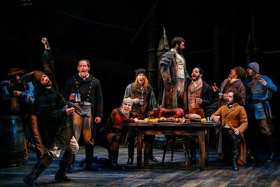Review: The Conclusion of Chris Coleman's Epic ASTORIA

Here in Portland, tis the season for world premieres of theatre of epic proportions. At Artists Rep, you can see the 5½-hour MAGELLANICA, while Portland Center Stage is wrapping up ASTORIA, a two-part play about the first United States settlement on the west coast - both ambitious tales of harrowing adventures.
ASTORIA was adapted from Peter Stark's book of the same name (read my review of Part One here). It's a broad, very dense history of the expeditions, funded by John Jacob Astor, that led to the founding of Astoria and the expansion of the United States to the west coast. Without those expeditions, we learn at the end of the play, we in the PNW might be Canadian, or even Russian.
Part Two picks up as the sailing party has just arrived at their destination, while the now-fractured overland party is still struggling through the mountains. It's a gripping history, and the story is well told. One of the best parts is the way Coleman weaves so much of the characters' humanity into it - the men, woman (yes, just one), and children who embarked on the journey were courageous in the face of seemingly unbeatable odds. But they were also human, often driven by pride and fear. The script brings all this out, giving us a very human drama as well as a historical one.
My assessment of Part Two mirrors that of Part One. Highlights include the gigantic and spectacular set, the music (Coleman incorporates folk music from the various cultures represented in the expedition parties), and the phenomenal cast, which includes some of the biggest names in local theatre.
On the other hand, the script relies entirely too much on the actors narrating their own action while they're doing it (i.e., Leif Norby saying, "He pivots," as he turns around). This is especially evident, and most tiresome, in a fight scene about mid-way through the play. It's also too long. I was absolutely riveted for about 2 hours and 15 minutes, but the play runs 2 hours and 45 minutes. There were some bits that could easily have been cut, like the scenes with Mrs. Astor, who didn't contribute to this second part. There were also several scenes between the end of the main story and the concluding wrap-up of Oregon history that felt like filler. Without those, the play would have been just as epic and also a more manageable length.
Overall, ASTORIA is a great way to learn the history behind the place we all call home. It reminds us to be grateful to the people who sacrificed their lives, as well as recognize the cultures that had been here long before Astor conceived his plan.
If you've seen Part One, you should be all set. If you haven't, you can catch a special replay of it on February 11, 15, and 17. Part Two runs through February 18. More details and tickets here.
Photo credit: Patrick Weishampel/blankeye.tv
Comments
.png)
|
.png)
|
Videos

